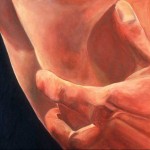 Do you allow yourself to be vulnerable to uncomfortable feelings and memories concerning your relationship with you father? Or, like a lot of men, do you shelve that which stimulates your temptation to weep? Maybe you’ve decided that being in competition with the “image” you’re supposed to embrace as a man is more a priority than feeling your feelings and uniting the separated compartments of your life.
Do you allow yourself to be vulnerable to uncomfortable feelings and memories concerning your relationship with you father? Or, like a lot of men, do you shelve that which stimulates your temptation to weep? Maybe you’ve decided that being in competition with the “image” you’re supposed to embrace as a man is more a priority than feeling your feelings and uniting the separated compartments of your life.
It’s my hope that vulnerability has won the battle as you’ve read through these three posts on the Father Wound. What do you do next? You have a lot of choices. You can be resentful disappointed toward the man who was supposed to “be there” for you. You can pity him or try to understand him. All of these reactions are valid. Some will bring you momentary satisfaction. Some may destroy your soul.
My solution has been to learn to be my own wise parent to heal my past. This is more plausible than you may think. Books have been written on the subject (check anything under “inner child”) and effective therapists and coaches might also suggest this methodology.
Ultimately we are spirits with a physical body. Our consciousness goes beyond time and space. We are thus able to experience feelings associated with the past as well as the present. We can access the way we related to important people and events throughout our lives from the vantage point of adulthood.
By accessing our childhood experiences we relive them in our memories, in our feelings and in our bodies. We can also dialogue with this “wonder child” who is still within us and who is the core of the very best of who we are. Our identity is a continuum; we never “stopped” being that wonder child. Our child simply took on adult characteristics but maintained his wonderful essence. We can thus “parent” our own self whenever we allow our adult-consciousness to make room for our child-consciousness. We can rework the effects of events and feelings we experienced as children through the lens and wisdom of our adulthood.
The wonder child, after all, craves our attention. The trouble is we as adults don’t always pay attention to the presence of this child within, because he brings up painful memories, in this case our Father Wound. But as long as we ignore him he will pull on our arm and demand we pay attention. While it may be difficult to listen to his story, we can actually be healed as we embrace the pain and suffering our child has endured, forgive him for being a constant reminder, and let him know: It’s going to be alright; I’ll take care of you.
When we “sit down” with our child, imagining him to be sitting across from us, we are able to listen to him speak in his own small voice. By verbalizing what our child has been trying to say for years, he not only finds his voice, but an empathic adult who finally listens to him. Our adult self can hear our inner child in a way our parents were unable or unwilling to do so. We can express our love for that child by accepting him into our lives as our own dearest self, lost and alienated by abuse or neglect or just indifference.
Parenting our inner child is an ongoing and often repetitive work. What experiences from your past might benefit from this parenting exercise? What aspects of your relationship with your father still plague you or create conflict within you? What does that child have to say to you about his Father Wound and how might you, as the adult, help him find healing?
Contact the Man’s Coach at michael@parisecoaching.com .
